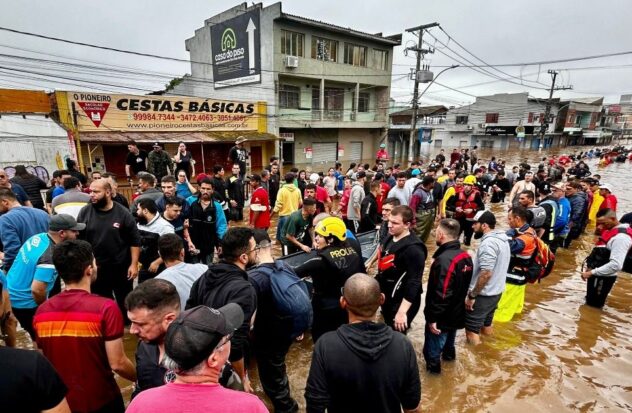Porto Alegre, Brazil faces a race against time to mitigate the ravages of the floods that have hit the state of Rio Grande do Sul, unleashing a tragedy of alarming proportions. With a death toll of 66 and 80,000 displaced, authorities and residents are mobilizing to avoid an even greater catastrophe.
The shocking images show the magnitude of the disaster: houses submerged under water, families who have lost everything and the heart of modern Porto Alegre, with its 1.4 million inhabitants, completely flooded.
Despite the intermittency of the rains on Sunday morning, the waters continue their relentless advance on the metropolis. The level of the Guaíba River, which runs through the city, reached 5.30 meters, surpassing the historical record of 4.76 meters recorded during the 1941 floods, according to the mayor’s office.
The outlook is bleak, with an increase in the number of affected areas. In the popular Sarandí neighborhood, a parking lot for trucks and road machinery is completely submerged, with barely the roofs of the vehicles visible above the reddish waters.
With 15,000 people housed in shelters and more than a million homes without water supplies, the destruction is catastrophic, according to Civil Defense. Residents like Rosana Custodio, a 37-year-old nurse, share stories of desperate evacuation, leaving behind their homes and belongings.
The governor Eduardo Leite described the situation as “dramatic” and “unprecedented”, while the Minister of Communication of the Presidency, Paulo Pimenta, points out that Sunday will be crucial for rescue operations.
A massive reconstruction effort, comparable to the Marshall Plan, will be needed once the waters recede and the rains stop. For now, the priority is to guarantee food supply and maintain the productive chain in this agricultural state, which represents Brazil’s fifth GDP.
Porto Alegre is practically under siege, with access roads cut off and basic services affected. The number of missing and injured people continues to increase, while national and international solidarity is present in the midst of the tragedy.
The disaster, attributed to a combination of climate change and the El Niño phenomenon, hit hard a city historically linked to its port and extensive watershed. What was once a blessing for its development has today transformed into an unprecedented calamity.
Source: With information from AFP



